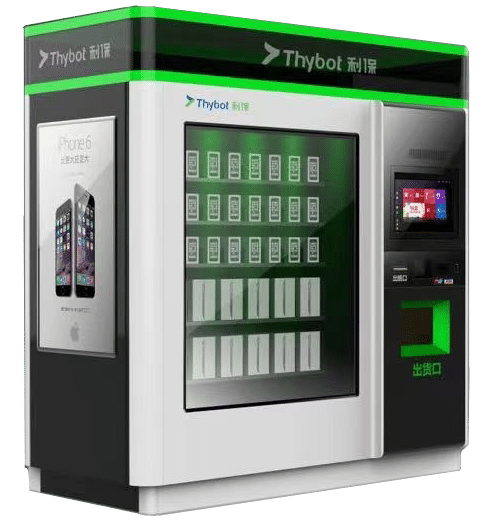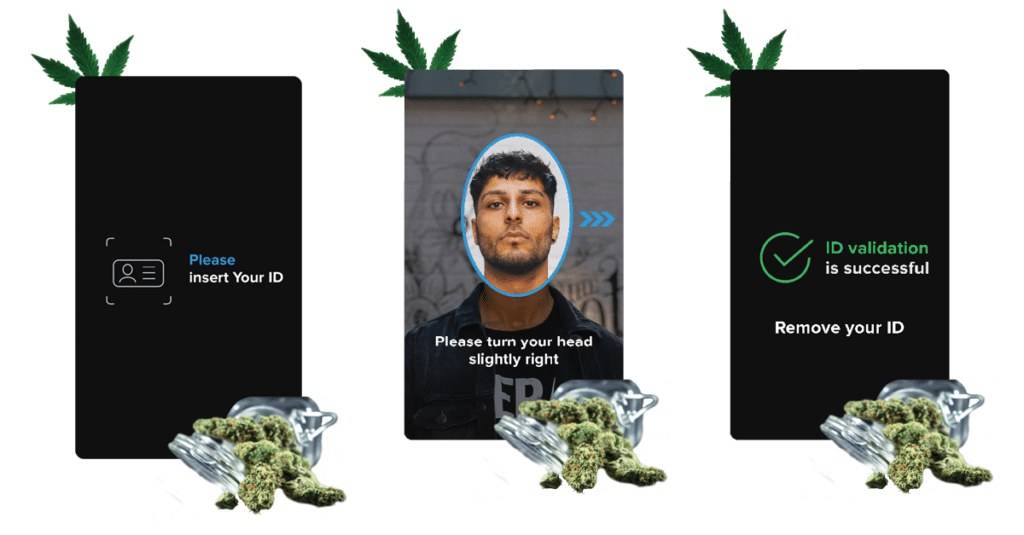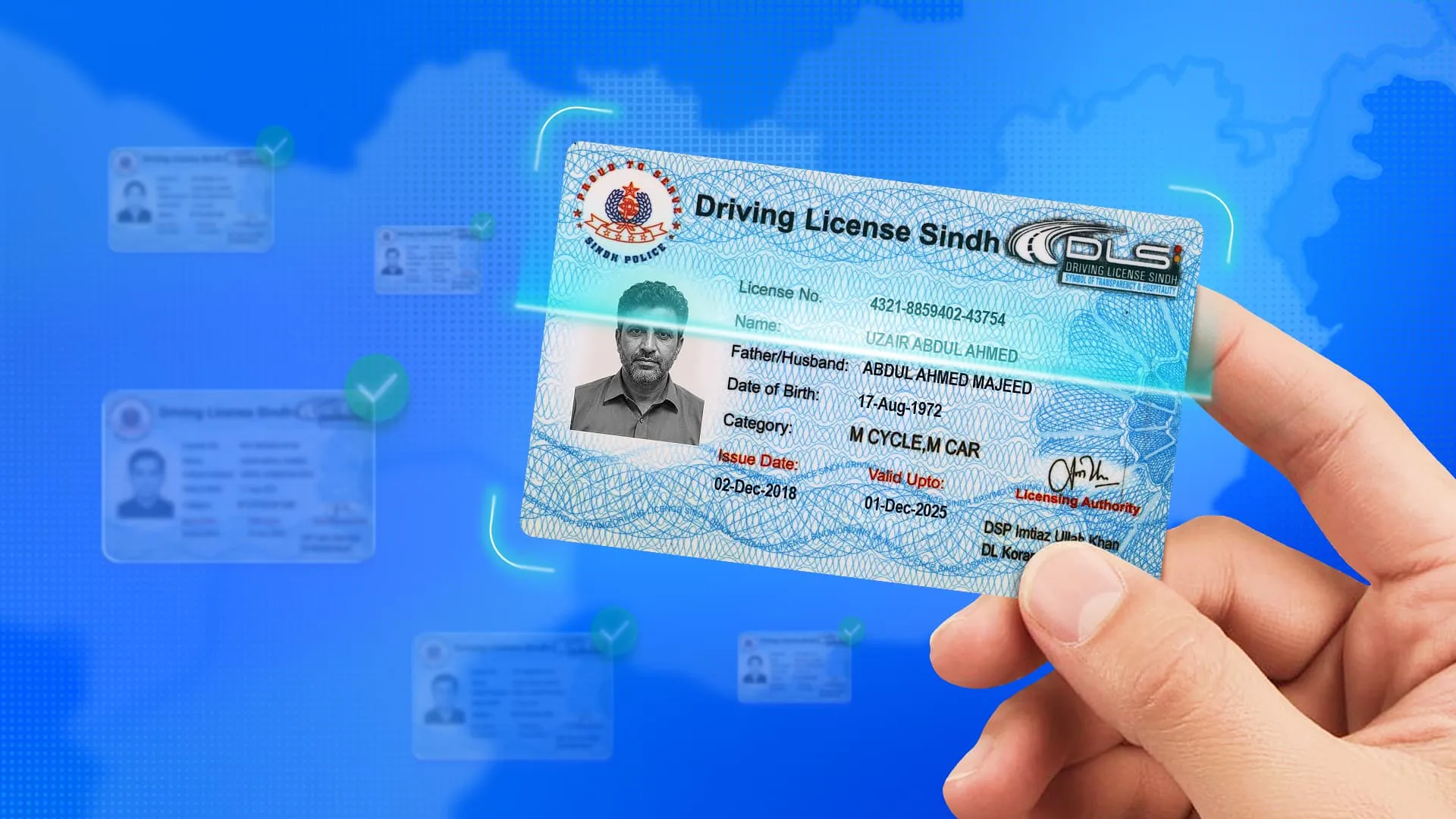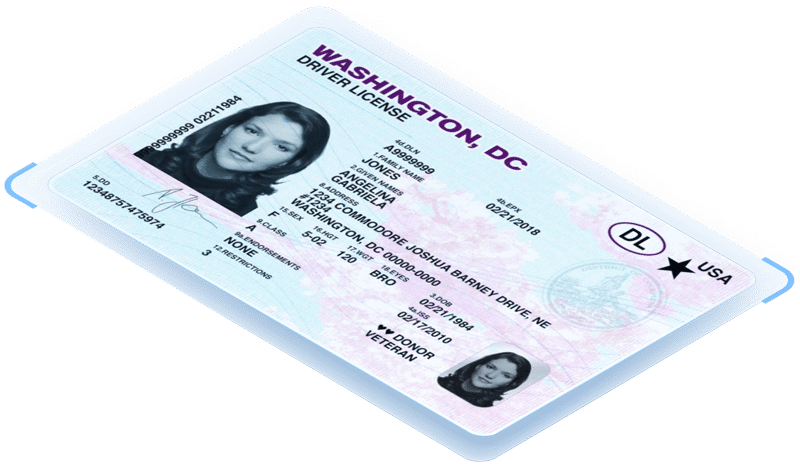The COVID-19 pandemic changed the landscape of cannabis sales, fueling the successful, rapid adoption of curbside pickup, drive-thru, and delivery services. As the landscape continues to evolve, the cannabis industry has its eye on another proven alternative to in-person retail transactions – unattended retail.
The concept of a cannabis vending machine has been popular for many years due to the desire to add a new revenue stream without large additional startup or labor costs. They can also decrease the complexity of the dispensary experience, which currently includes multiple interactions with security, ID checkers, budtenders, and cashiers, by streamlining cannabis purchases to a more simplified checkout process.
Cannabis vending machines aren’t the old-school vending machines where you press B3 in order to get a bag of chips – these are innovative units with interactive touch screens that offer an endless array of product options while performing age and identity verification to ensure compliance with regulations.
What are weed vending machines?
Vending machines for age-restricted products are not a new concept but are far less common in the US today than their non-age-restricted counterparts. Cigarette vending machines were first developed in 1926 by William Rowe, who went on to found the first manufacturing company in the U.S. to mass produce unattended retail machines for tobacco. However, due to the inability of these machines to verify the age of the consumer, these devices have become relatively rare and are typically only found in places that restrict minors from entering, like bars or nightclubs.
In 2024, there is a renewed interest in developing solutions to the problem of age verification and unattended retail for products like alcohol, tobacco, and cannabis.

Today’s vending machines for age-restricted products are sophisticated pieces of equipment that combine the classic vending machine with modern technology. These machines are often temperature-controlled and feature a touchscreen interface, making it easy to browse and select products.
IDScan.net’s weed vending machines feature a fully interactive touchscreen that displays the product options housed inside. Inside the machine itself, the inserts are completely customizable and molded to the specific products being sold. While this is already an impressive improvement from old-school vending machines, the checkout process is what makes these weed vending machines truly unique.
How do weed vending machines work?
The checkout process for cannabis vending machines combines hardware and software solutions to ensure a seamless and secure experience while ensuring compliance. The regulations around cannabis are strict, and failure to meet those regulations can result in hefty fines or loss of licensure, so the age verification process must be robust and accurate, ensuring that only customers 21+ are able to purchase products.

The checkout process for Adaptive AI age-restricted vending machines has an efficient, built-in age and identity verification process.
- The customer inserts their ID and the scanner runs a series of tests on the ID known as ID authentication to both ensure the user is at least 21 and that the ID is not fake.
- The on-unit camera is used to compare the customer’s face to the photo on the ID. The customer is prompted on the screen to follow a short series of prompts to ensure liveness and legitimacy. This step prevents usage of a borrowed or stolen ID.
- The embedded computer analyzes all of the data and provides a pass or fail result, either allowing the transaction to proceed or preventing it.
These steps run simultaneously and take 30 seconds or less. The verification process initiates at the end of the transaction to ensure a verified user can’t walk away and have a transaction completed by a minor.
Benefits of weed vending machines
Cannabis vending machines are a convenient and accessible way for users to purchase their favorite cannabis products and can act as a supplement to the more commonplace in-person transactions.
Improve overall customer experience
By adding a cannabis vending machine to an existing dispensary, operators allow customers who already know what they want without assistance to purchase their items and go, which can especially reduce wait times during peak hours. Meanwhile, customers who may want to spend more time with their budtender, learning about products and receiving personal recommendations, can do so without feeling pressured by a line of customers waiting behind them. Budtenders and customers can take their time with transactions, even during peak hours, while customers in a rush can make their purchases quickly.
Streamline staff responsibilities
Budtenders are often the heart and soul of a dispensary, however, according to reports by Headset, nearly 55% of budtenders have been with their dispensary for less than one year. High turnover rates can present an operational challenge. Using a weed vending machine can alleviate some staffing challenges by providing a sales workflow that does not require an attendant. Cannabis vending machines within the dispensary can allow more time for staff training and other operational responsibilities.
Serve customers outside of normal business hours
While currently most cannabis vending machines are housed within an existing dispensary, as they become more widely understood and adopted, these machines will allow customers to make purchases outside of business hours. Weed vending machines could be placed in vestibules or directly outside of dispensaries, similar to ATMs at banks, and allow for after-hours purchases.
Sell cannabis in nontraditional environments, like festivals
There are environments primed for cannabis sales that are not currently being targeted. Festival grounds, concert venues, and food halls could all be prime real estate for a cannabis vending machine, keeping sales secure and verified without the need for a large and permanent location.
Reduced startup and operational costs
For those looking to get into the cannabis industry a brick-and-mortar location is often out of scope. The cost of renting a space, insuring, outfitting, maintaining, and staffing all add up quickly, making the industry inaccessible to those who may be knowledgeable and passionate about cannabis but without sizable startup funding. A cannabis vending machine has a much more attainable price tag for those breaking into the industry, allowing individuals to develop their brand, learn consumer habits, and build funding without relying on outside backing.
Expand the footprint of cannabis retailers
Retailers looking to expand their footprint may face similar challenges to those breaking into the business – while customer interest may be there, expansion costs may be too high for rapid growth. Vending machines offer an opportunity to expand a dispensary’s footprint, while not investing more money than the dispensary can comfortably spend.
Allow product manufacturers to sell direct-to-consumer
Manufacturers can use cannabis vending machines to get their products in front of customers, without the added costs or barriers that come with some retail partners.
Enhance security
It may seem counterintuitive, but cannabis vending machines are often more secure than in-person ID checks. Age-restricted vending machines are capable of detecting fake IDs, verifying age, and ensuring that the ID matches the person presenting it. Simple human error or lapses in judgment due to rushing through transactions can allow for missed details that Adaptive AI technology spots instantly.
Contactless transactions
In the wake of COVID-19, consumers and staff often feel safer with contactless transactions. With a primarily cash-based business, this can be difficult to navigate, but vending machines offer customers the ability to make contactless purchases.
Are weed vending machines legal?
As with most things cannabis related, the legality depends entirely on what state you’re in. While it is legal in some states with minimal regulations, other states have much stricter regulations surrounding unattended retail. Colorado is currently the only state to specifically allow for marijuana vending machines and outline regulations for operations.
A few states have specifically banned cannabis from being sold in vending machines. When Minnesota legalized recreational cannabis in August 2023, the law specifically stated that cannabis products could not be sold in vending machines. Virginia took an even more restrictive approach when the state legalized cannabis in 2021, stating that not only are cannabis vending machines not allowed, but drive-thrus and delivery services are also prohibited. The most surprising state with anti-cannabis vending regulation is Washington. Washington was one of the first states to legalize recreational cannabis use and actually had the very first cannabis vending machine in the country, launching in early 2015. However, Washington state code Title 69 does state that retailers are prohibited from operating vending machines for the sale of cannabis products. Other states with legal recreational cannabis that have restricted marijuana vending machines include Maine, Massachusetts, Nevada, New York, and Ohio.
States where weed vending machines are legal
Below is a state-by-state overview of regulations specific to cannabis vending machines, as of August 2024.
| Alaska | There is no current limitation on vending machine use for cannabis sales from the Alaska Alcohol & Marijuana Control Office. Weed vending machines would still need to adhere to state and local regulations for marijuana retail sales. |
| Arizona | There is no current limitation on vending machine use for cannabis sales outlined by the Arizona Department of Health Services. Cannabis vending machines would still need to adhere to state and local regulations for marijuana retail sales. |
| California | Cannabis vending machines are allowed but not specifically mentioned in regulations by the Department of Cannabis Control. Machines must verify age, accept cash payments, be secure, and comply with any local regulations, which vary by city and county. |
| Colorado | The Marijuana Enforcement Division allows for automated cannabis vending machines within dispensaries. Machines must be reasonably monitored and comply with statewide dispensary rules, including packaging and labeling requirements, inventory tracking, and identification requirements. |
| Connecticut | There is no current limitation on vending machine use for cannabis sales outlined by the Connecticut Department of Consumer Protection. Cannabis vending machines still need to adhere to state and local regulations for marijuana retail sales, including specifications around the storage of consumer information. |
| Delaware | There is no current limitation on vending machine use for cannabis sales outlined by the Delaware Office of the Marijuana Commissioner regulations. Cannabis vending machines would still need to adhere to state and local regulations for marijuana retail sales. |
| Illinois | There is no current limitation on vending machine use for cannabis sales outlined by the Illinois state government. Cannabis vending machines would still need to adhere to state and local regulations for marijuana retail sales. |
| Florida | Currently only legal for medical marijuana. Must have an MMTC license, obtain state and local approval for vending machine location, and ensure seed-to-sale tracking. |
| Maryland | There is no current limitation on vending machine use for cannabis sales outlined by the Maryland Cannabis Administration. Weed vending machines would still need to adhere to state and local regulations for marijuana retail sales. |
| Michigan | There is no current limitation on vending machine use for cannabis sales outlined by Michigan’s Cannabis Regulatory Agency. Marijuana vending machines would still need to adhere to state and local regulations for marijuana retail sales. |
| Missouri | There is no current limitation on vending machine use for cannabis sales outlined by Missouri’s Department of Health’s cannabis regulations. Cannabis vending machines would still need to adhere to state and local regulations for marijuana retail sales. |
| Montana | There is no current limitation on vending machine use for cannabis sales outlined by the Montana Cannabis Control Division. Weed vending machines would still need to adhere to state and local regulations for marijuana retail sales. |
| New Jersey | There is no current limitation on vending machine use for cannabis sales outlined by New Jersey’s Cannabis Regulatory Commission. Marijuana vending machines would still need to adhere to state and local regulations for marijuana retail sales. |
| New Mexico | There is no current limitation on vending machine use for cannabis sales outlined by the New Mexico state government. Cananbis vending machines would still need to adhere to state and local regulations for marijuana retail sales. |
| Oregon | Cannabis vending machines are not specifically mentioned in regulations by the Oregon Liquor and Cannabis Commission (OLCC), but must still adhere to OLCC and local regulations. Any vending machines with inhalants must be on premises where persons under 21 years of age are not allowed. |
| Rhode Island | There is no current limitation on vending machine use for cannabis sales outlined by the Rhode Island state government. Weed vending machines would still need to adhere to state and local regulations for marijuana retail sales. |
| Texas | Due to the state’s limited cannabis legalization, cannabis vending machines must comply with strict state regulations, including limiting products to the federally allowed 0.3% or less TCH level. |
| Vermont | There is no current limitation on vending machine use for cannabis sales outlined by the Vermont Cannabis Control Board. Marijuana vending machines would still need to adhere to state and local regulations for marijuana retail sales. |
*Please note, the above states do not include states where CBD, tobacco, or alcohol vending machines are legal. This is strictly representative of cannabis. Cannabis laws and regulations are subject to change and cannabis is not federally legal in the US.
Do weed vending machines have to be placed in a dispensary?

In 2024, we are unaware of any examples of cannabis vending machines that are not inside a dispensary. However, there are many businesses that are eager to bring unattended retail for cannabis into new use cases, that may be outside of the 21+ environment of a cannabis dispensary. Age verification is a critical component to ensure that the machine remains secure in new environments.
Cannabis vending machines in the field
While the cannabis market is not flooded with vending machines yet, there are some already successfully operating around the country.
ZAR BOX
In November 2023, ZAR BOX was opened in Carrollton, Texas. The fully ADA-compliant cannabis vending machine was the first to utilize Adaptive AI facial recognition technology to verify that the purchaser matches the ID. ZAR BOX also authenticates IDs to catch fakes and verifies age and expiration status. The combination of ID authentication and face-match technology was essential to ensure the vending machine complied with all legal regulations.

Automated Cannabis Experience (ACE) | Colorado
Terrapin Care Station dispensary in Aurora, Colorado unveiled their marijuana vending machine in early 2023. These machines are more limited than the ZAR BOX because they do not have any way to verify that the ID matches the person presenting it, so they must be located within an age-restricted location. However, unlike the short-lived Anna vending machines that some Colorado dispensaries partnered with in 2020, the ACE is integrated with Colorado’s seed-to-sale marijuana tracking system, making it compliant with state regulations.

GreenSTOP | California
GreenSTOP has one current location in California and two indicated as “coming soon” in Oklahoma and Massachusetts. Similar to the ACE weed vending machine, these are limited to locations where the ID is scanned and verified before gaining access. GreenSTOP’s differentiator is that each unit has four purchase screens, allowing for simultaneous sales from one machine, provided there is room to navigate around all sides of the vending machine.

Compliance and Personally Identifiable Information (PII)
Data retention and security are important factors to consider when looking to purchase a weed vending machine, both to maintain compliance with regulations and to ensure your customer’s data is kept safe. Since laws can vary, be sure to check your state’s specific laws when it comes to data storage and retention. The VeriScan software that powers our age-restricted venting machines allows for customization on what data is collected and how long it is stored. It can be configured to not store any information, just collect certain information, like name and date of birth, or it can collect all the information available in the barcode of an ID. The length of time PII and other sensitive data are stored can be customized to fit your state’s specific needs and keep customer information secure.
Future developments in weed vending machine technology
Use of cryptocurrency to purchase cannabis products
Some solutions proposed by retailers include the integration of cryptocurrency, requiring customers to use a unique digital currency to complete a purchase. This currency can only be used at these machines, is non-transferable, and can only be purchased after completing an age verification process.
Selling ads on the machine display
The large touchscreen interface offers ample opportunities for advertising new products when the machine is not in use or recommending products during the checkout process.
Conclusion
The legality and adoption of weed vending machines is a rapidly changing landscape. New cannabis legislation is being passed frequently, and as it does, we ensure our solutions remain compliant. Our team of experts is always happy to help should you have any questions on how to get a weed vending machine set up in your dispensary.





